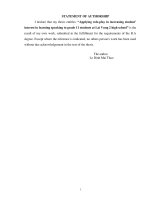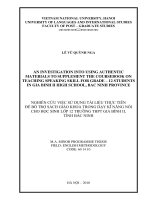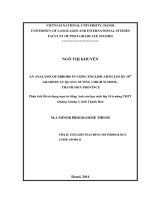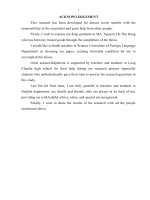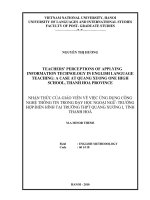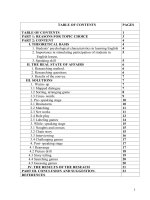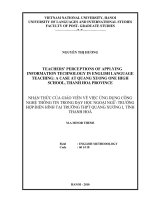A survey of using role play technique on learning speaking skills for grade 10 students at quang xuong 2 high school thanh hoa province
Bạn đang xem bản rút gọn của tài liệu. Xem và tải ngay bản đầy đủ của tài liệu tại đây (1.03 MB, 63 trang )
VIET NAM NATIONAL UNIVERSITY OF AGRICULTURE
FACULTY OF EDUCATION AND FOREIGN LANGUAGES
BA THESIS
A SURVEY OF USING ROLE-PLAY TECHNIQUE ON
LEARNING SPEAKING SKILLS FOR GRADE 10
STUDENTS AT QUANG XUONG 2 HIGH SCHOOL –
THANH HOA PROVINCE
KHẢO SÁT VIỆC SỬ DỤNG KỸ NĂNG ĐÓNG VAI TRONG
HỌC KĨ NĂNG NÓI ĐỐI VỚI HỌC SINH LỚP 10 TRƯỜNG
THPT QUẢNG XƯƠNG 2 – TỈNH THANH HÓA
Student:
NGUYEN HUYEN ANH
Student code:
621265
Major:
ENGLISH
Supervisor:
NGUYEN THI THUY LAN, M.A.
HaNoi – 2021
CERTIFICATE OF ORIGINALITY
I, the undersigned, hereby certify my authority of the study project report
entitled “A survey of using role - play technique on learning speaking skills for Grade
10 students at Quang Xuong 2 High School – Thanh Hoa Province” submitted in
partial fulfillment of the requirements for the degree of Bachelor in English
Language. Except where the reference is indicated, no other person’s work has been
used without due acknowledgement in the text of the thesis.
HaNoi, 2021
Nguyen Huyen Anh
Approved by
SUPERVISOR
i
TABLE OF CONTENTS
CERTIFICATE OF ORIGINALITY..................................................................... i
TABLE OF CONTENTS ........................................................................................ ii
ACKNOWLEDGEMENTS .................................................................................... v
ABSTRACT ............................................................................................................ vi
LIST OF ABBREVIATION ................................................................................. vii
LIST OF TABLES AND FIGURES ................................................................... viii
PART I: INTRODUCTION .................................................................................. 1
1. RATIONALE FOR THE STUDY ..................................................................... 1
2. AIMS AND OBJECTIVES OF THE STUDY .................................................. 2
3. RESEARCH QUESTIONS................................................................................ 3
4. SCOPE OF THE STUDY .................................................................................. 3
5. SIGNIFICANCE OF THE STUDY ................................................................... 3
6. DESIGN OF THE STUDY ................................................................................ 3
PART II: DEVELOPMENT .................................................................................. 6
CHAPTER 1: LITERATURE REVIEW........................................................... 6
1.1. REVIEW OF THE PREVIOUS STUDIES ..................................................... 6
1.1.1. Review of previous research in Vietnam................................................ 6
1.1.2. Review of previous research in the World ............................................. 7
1.2. REVIEW OF THEORETICAL BA-CKGROUND ......................................... 8
1.2.1. Overview of Speaking skills ................................................................... 9
1.2.1.1. Definition of speaking skills ............................................................. 9
ii
1.2.1.2. The components of speaking ............................................................ 9
1.2.1.3. Activities to improve speaking classes ........................................... 13
1.2.2. Overview of Role - play ....................................................................... 15
1.2.2.1. Definition of role - play .................................................................. 15
1.2.2.2 The steps for role - play activity ...................................................... 16
1.2.2.3. Advantages of using role - play in learning speaking skills........... 20
1.2.2.4. The difficulties of using role - play technique ............................... 21
1.3. SUMMARY ................................................................................................... 23
CHAPTER 2: METHODOLOGY.................................................................... 24
2.1. RESEARCH GOVERNING ORIENTATION .............................................. 24
2.2. RESEARCH METHODS .............................................................................. 24
2.2.1. Major method(s) ................................................................................... 24
2.2.2. Research setting/context ....................................................................... 25
2.2.3. Data collection ...................................................................................... 25
2.2.4. Data analysis ......................................................................................... 28
2.3. SUMMARY ................................................................................................... 29
CHAPTER 3: FINDINGS AND DISCUSSION .............................................. 30
3.1. STUDENTS' PERCEPTION AND ATTITUDE OF ROLE PLAY IN
LEARNING SPEAKING SKILLS ....................................................................... 30
3.1.1 Students' perception of role play in learning speaking skills ................ 30
3.1.2. Students' attitude of role play in learning speaking skills .................... 37
3.2. DIFFICULTIES OF STUDENTS WHEN PARTICIPATING IN ROLEPLAYING ACTIVITIES IN LEARNING SPEAKING SKILLS ........................ 39
iii
3.3. SUMMARY ................................................................................................... 40
PART III: CONCLUSION ................................................................................... 42
1. RECAPITULATION ....................................................................................... 42
2. CONCLUDING REMARKS ........................................................................... 43
3. LIMITATION OF THE STUDY ..................................................................... 45
4. RECOMMENDATIONS FOR FURTHER STUDY....................................... 45
REFERENCES ......................................................................................................... i
APPENDIX 1: QUESTIONNAIRE FOR STUDENT ........................................ iii
APPENDIX 2: INTERVIEW FOR TEACHERS .............................................. vii
APPENDIX 3: INTERVIEW FOR STUDENT ................................................ viii
iv
ACKNOWLEDGEMENTS
During the course of my research, I have received contributions and support
from many people.
First, I would like to express my deepest gratitude to teacher Nguyen Thi Thuy
Lan M.A for her enthusiastic and useful guidance, helpful and insightful comments.
This thesis would not have been possible without her constant support and
encouragement.
Secondly, I would like to thank all of the teachers in the Faculty of Foreign
Languages - Vietnam National Academy of Agriculture for imparting useful
knowledge and helping me during my study and research.
Next, I would like to express my special thanks to teacher Do Thi Thuy, Ms.
Vu Thi Thieu, who teaches English and all students in grades 10C1, 10C9 of Quang
Xuong 2 High School who participated in answering questionnaires and interviews
for me to complete this thesis.
In the process of practicing and completing the thesis, I have tried my best, but
I cannot avoid shortcomings. I look forward to receiving your comments and
suggestions to improve this thesis.
Last but not least, I would like to give a special thanks to my family, friends
and so many others, who have always supported and loved me throughout the process
of complete my research!
Nguyen Huyen Anh
v
ABSTRACT
Among four skills namely listening, speaking, reading, and writing, learners
have favored speaking because it is used to communicate with people. However,
students still have been faced with difficulties in learning speaking skills. Therefore,
the research was carried out with the aim of providing techniques and methods to
learn speaking skills better, specifically here applying role - playing skills to help
increase students' interest in learning to speak. When applying role - play, students
are placed in an interesting talking environment, promoting more creative
imagination, thereby igniting interest and helping students talk as much as possible.
The data used for analysis in this study are mainly collected through survey
questionnaires, through observations of two classes with teachers who have applied
this activity and through face - to - face interviews. The thesis has mentioned the
difficulties when students learn to speak and how useful after applying the skill of
role - playing. One of the outstanding results from the data analysis is that the
students of Quang Xuong 2 High School are very interested in learning to speak
when applying the role - play method.
vi
LIST OF ABBREVIATION
N: Number
Ss: Students
Ts: Teachers
vii
LIST OF TABLES AND FIGURES
Tables of students'questionnaire analysis
Table 2.1: Criteria for judging the degree of problems ........................................... 29
Table 2.2: Students' interest in English speaking skills ........................................... 30
Table 2.3: Role - play activities in speaking are important to students ................... 30
Table 2.4: Students' understanding of the definition of role - play.......................... 31
Table 2.5: Students' opinions on the steps to role - play.......................................... 33
Table 2.6: The benefits for students when teachers apply role - play activities ...... 34
Table 2.7: Descriptive Statistics: Students' opinions when participating in role - play
activities.................................................................................................................... 37
Table 2.8: Difficulties students face when participating in role- play ..................... 39
Figure of students'questionnaire analysis
Figure 2.1: Applying role - play activities in learning speaking.............................. 32
Figure 2.2: Students’ improve their English speaking skills ................................... 35
viii
PART I: INTRODUCTION
1. RATIONALE FOR THE STUDY
In today's world, English has become a language of international
communication. English is really the most important language in the world, English
is spread anytime, anywhere and is the official language of over 53 countries and
territories. However, For the education of English to achieve success, the four skills,
listening, speaking, reading and writing, should be integrated in the most efficient
way.
In the industrial era 4.0, almost all industries of commerce, healthcare, media,
tourism, ... are using English to communicate. In most of the meetings, forums and
exchanges of work, knowledge and experience in the world, this international
language is used as a bridge. So, English plays an extremely important role, it is not
only a communication tool between people, but also creates opportunities for
advancement for those who are working, employees who are working in enterprises
foreign countries or joint ventures with foreign countries and especially it helps
people keep up with the progress in the modern technology era.
But one thing cannot be denied that using English for speaking is not simple
since learners have to master several important elements of English such as
pronunciation, grammar, vocabulary, fluency and comprehension. In fact, students
can master the rules of grammar, but the use of English fluently to communicate is
still very modest; students are still very afraid of using English and there are still
many difficulties and obstacles that hinder students for many different objective and
subjective reasons, especially high school students - the highest level of general
education pine.
1
In that case, teachers are supposed to be creative in developing their teaching
learning process to give attention to the elements of speaking, improve students'
speaking skill, and make the English lesson more exciting. Hence, it is crucial to
propose appropriate techniques to overcome the students' low speaking ability. It is
the need of the teacher to find out an effective technique in order to stimulate the
students' positive attitude towards the speaking class and their speaking skills.
Currently, in High schools, most teachers apply traditional teaching methods
of teaching grammar structures and explaining vocabulary, so students may feel
bored in speaking lessons. Therefore, students and teachers need to fully exploit the
best learning methods. (Burns & Joyce, 1997: 10) said that there are many methods
to learn and practice improving English-speaking skills, but one of the methods that
create the most interest in the lesson is to learn and practice. Role - play method, so
the author has decided to choose to role - play as an effective teaching method.
Role - playing plays an important role in teaching speaking because it gives
students the opportunity to practice communicating in different social contexts,
situations, and in different roles.
Fully aware of the above problem, the researcher decided to carry out an
investigation of using role-play techniques on learning to speak to Grade 10 students
at Quang Xuong 2 High school. Through this thesis, the researcher will grasp the
reality of applying role-playing activities in speaking lessons of high school
education and hope to help students and teachers realize the usefulness of role playing activities and thereby find more interest in speaking class.
2. AIMS AND OBJECTIVES OF THE STUDY
The general aim of the study is to investigate of learners when using role - play
activities in learning speaking skills of 10th Graders at Quang Xuong 2 High School.
2
There are several objectives of the study, those are:
To examine the students' perception and attitudes toward using role - play
activities in learning speaking skills.
To identify difficulties from using role - play activities in their speaking
classes of 10th Graders at Quang Xuong 2 High School.
3. RESEARCH QUESTIONS
In order to achieve a successful research result, it is necessary to focus on the
following main goals:
1. What is students’ perception and attitude about using role - play activities in
learning speaking skills at Quang Xuong 2 High School?
2. What difficulties do 10th Graders at Quang Xuong 2 High School face when
using role - play activities in their speaking classes?
4. SCOPE OF THE STUDY
This study focuses on the use of role - play activities in the speaking learning
of grade 10 students. Also, the study is limited to the context of Quang Xuong 2 High
School with the participation of 80 students Grade 10 including 10C1 and 10C9.
Although the author is well aware that the survey statistics are not fully
representative of all 10th graders students in Vietnam, the researcher hopes to
propose some of the most popular facts that occur in the study. The survey was
conducted from March 1, 2021 to June 30, 2021.
5. SIGNIFICANCE OF THE STUDY
Role-play is the basic and best method when learning speaking skills - an
essential and important skill for learners to function in a collective or community.
Through this study, this researcher will try to make important contributions to
English learning such as:
3
For students, it is possible to help students to properly understand, fully
understand and deepen their understanding of role - play activity and the steps to do
it. Thereby increasing the interest in learning to speak English for students,
contributing to motivation and high learning results especially for students at
Quang Xuong 2 High school. From this study, it is possible to see the difficulties
that students are facing when performing role - playing activities, thereby as a basis
for finding solutions to those difficulties
For other researchers who conduct the same study, the result of this study is
expected to be a reference and contribute more information to solve the same
problems.
6. DESIGN OF THE STUDY
In addition to the introduction and conclusion, the thesis is structured into 4 part
clear layouts:
Part I: Introduction
In Introduction, there is a little explanation about background of the study, the
urgency of the study and problem statement, aim and objectives of the study, research
questions, scope of the study, methodology of the study, significance of the study
and design of the study
Part II: Development which is systematically divided into three chapters. The
following is a short description about what each chapter contains.
Chapter 1: Literature review. This chapter includes review of the previous
studies and review of theoretical background relevant to the study.
4
Chapter 2: Methodology. This chapter deals with research governing
orientation and research methods. Finally, a discussion emerging from the findings
is presented to answer the research questions.
Chapter 3: Findings and Discussion, this chapter presents the results of survey
questionnaires, observation and interview of teacher and students when applying
role-play activities in speaking classes.
Part III: Conclusions, this is a chapter consisting of an overview of the study,
presents recapitulation, concluding remarks, also talks about limitations of the study
and finally gives recommendations for further study.
5
PART II: DEVELOPMENT
CHAPTER 1: LITERATURE REVIEW
1.1. REVIEW OF THE PREVIOUS STUDIES
English is now really important for all ages and especially activities to promote
learning more and more speaking skills, so the world in general and in Vietnam in
particular has had many studies. About applying role - play as a method to improve
students' speaking skills.
1.1.1. Review of previous research in Vietnam
In Vietnam today, there are many different activities that teachers often apply
in speaking lessons to create interest and concentration for students. However, it can
be seen that role - play is the most popular and best method when learning speaking
skills - an activity that integrates enough benefits such as creating more interest, more
familiar topics, and helping students have the opportunity to speak more English.
Therefore, this study is very popular in Vietnam and is typical:
(Hien, 2004) has studied “Improving speaking English skill of the grade 10
students at Thoai Ngoc Hau High school by using dialogs and role – play”. He has
stated some definitions about dialog and role - play and shown the steps to carry out
role - play activities. He also stated some advantages when teachers apply this
activity in teaching speaking. In addition to the issues studied in this thesis, it is
possible to study more difficulties that students face when participating in roleplaying activities in speaking class.
(Huyen 2012) has studied “The use of role play activities to improve speaking
skills for the first - year English major students at HaNoi university of Industry”. She
researched on the subjects of the first year students majoring in English at HaNoi
6
university of Industry. The purpose of this study is to investigate the real situation of
teaching and learning speaking skill to the first year English, major students at HaUI
including the quality and methods of teaching and learning speaking skills; to
research how the speaking skills of the first year English major students at HAUI can
be improved through using role play activities and to examine the students' attitudes
toward using role - play activities in te aching and learning English. In her research,
she showed how to improve the speaking skills of first - year English majors at HaUI
through the use of role - playing activities.
(Anh 2018) researched the topic: “Assessment of first-year English majors on
role - playing activities at the University of Foreign Languages and Informatics”. Her
purpose in the research is that she wants to find out the most objective opinion of the
first year English major at the University of Foreign Languages and Informatics.
After 10 weeks of research, she came to the conclusion that role - playing gives
student’s confidence and improves speaking skills.
In general, all three of these studies have in common that the researchers all
conclude the advantages and benefits of applying role - playing activities to the
speaking subject of the students they study. This study is very helpful because it
provides the theoretical background for the thesis.
1.1.2. Review of previous research in the World
Currently, in the world, role-playing activities are studied by many students
and lecturers, because role-play is a highly effective method of learning speaking
skills. A number of people study the forms of role - playing, the benefits of roleplaying, the advantages and disadvantages of role - playing, etc. From those studies,
the benefits of role - playing have been shown to students. Some notable studies are:
7
Graves (2008) conducted a study to learn about the effectiveness of Role Playing concluded that “Role – Play” is really useful and should be used in the
classroom. Graves also believes that applying “Role – playing” to the classroom is
more effective than traditional learning.
Samsibar & Wahyuddin Naro (2016) has studied: “The effectiveness of role play method toward students’ motivation in english conversation. This study aims to
find the effectiveness of role - play method toward the students’ motivation in
English conversation for the first grade students at MTs As’adiyah No. 49 Bola
Aserae – Belawa academic year 2016/2017”. The last, the researcher concluded that
the role - play method really works and motivates students a lot.
Another study done by Citraningtyas & Purnawan (2016) – “Improving The
Students ' Speaking Skill Through Role - Play Technique of Class Xi Mia 5 Of Sma
Negeri 2 Yogyakarta in The Academic Year of 2015/2016”. After three times
applying the “Role – playing” activity to the English Speaking class, they believe
that the students' Speaking skills have improved markedly and these students are also
creative, focused and interested in the activities to speak.
In summary, all two studies above show the advantages of “Role – Play”. But
in fact, when the writer asked the question about role-playing for students, he
received some mixed reactions. It is this that has prompted the author to conduct a
research on this topic to clearly see the objective opinions from the students
themselves about the reality of applying the “Role – play” technique.
1.2. REVIEW OF THEORETICAL BACKGROUND
This chapter, clarifies the theory of 2 main theoretical areas: Overview of
speaking skills and the theory of role - play activities with the implementation
process.
8
1.2.1. Overview of Speaking skills
1.2.1.1. Definition of speaking skills
So far there have been a lot of definitions of speaking given, each dealing with
one aspect of speaking, however, they all state that speaking involves speech and
through speech speakers express their attitudes, feelings, etc. In the Oxford
Dictionary of Current English (2009: 414), speaking is “the action of conveying
information or expressing one's‟ thoughts and feelings in spoken languages”.
Besides, according to Gert and Hans (2008: 207), speaking is speech or utterances
with the purpose of having intention to be recognized by the speaker and the receiver
processes the statements in order to recognize their intentions.
In terms of language teaching and learning, speaking is considered as one of the
four important language skills (listening, reading, speaking and writing) to practice
and master. In this light, Nunan (2003: 48) puts it that “speaking is the productive
oral skill. It consists of producing systematic verbal utterance to convey meaning.”
To sum up, there are different ways to define speaking, i.e. speaking as an
action, a process and a skill. In this study, the term “speaking” will be used as a skill
related to language learning.
1.2.1.2. The components of speaking
In learning English, teachers should encourage students to practice speaking
English regularly every day. This helps students to be able to speak English fluently
and accurately. However, in order for students to speak English fluently and with the
fewest mistakes, it is important to know the 5 components of speaking skills. Here,
the list of components of speaking skills according to Syakur (1987).
9
Accuracy
Gower, et al. (1995, p.99-100) give two main aspects of speaking skill. They
are accuracy and fluency. ‘Accuracy involves the correct use of vocabulary,
grammar and pronunciation. In controlled and guided activitiy the focus is usually
on accuracy and the teacher makes it clear from feedback that accuracy is
important". In speaking accuracy is very important and teachers should encourage
students to use the correct language. However, teachers should not be too focused on
accuracy because if they pay too much attention to producing language from the
beginning, they could not speak fluently. Gower suggested that on particular
activities, teachers should make it clear to students in which areas accuracy is
expected and to what extent.
According to McDonough and Shaw (2003), pronunciation is taught in a
variety of ways and for a variety of reasons. Teachers may devote entire lessons to
it, or they may simply deal with it as it happens. Some teachers enjoy "drilling"
accurate pronunciation patterns, while others are more concerned with their pupils'
ability to comprehend within fluency (p.136). Since there is no uniform pattern for
teaching pronunciation, the process of teaching pronunciation is entirely dependent
on the teacher. Some teachers adopt a "bottom up" approach, in which pupils work
on forming and hearing sounds as accurately as possible. Pronunciation, on the other
hand, is seen as part of a broader communication approach in "Top down" learning
(McDonough & Shaw, 2003, p.136).
Correct vocabulary selection is also critical for effective speaking. The
objective of vocabulary instruction, according to Richards (1976, p.88), ‘the goals of
vocabulary teaching must be more than simply covering a certain number of words
on a word list. Then teachers must look into how teaching techniques can help realize
the concept of what it means to know words. Vocabulary has for some time been one
10
area of the syllabus where this link between approach, method and technique has
been neglected’. When dealing with elementary school students, teachers should
teach them some common words because they will require those terms in their
speech. Otherwise, kids will struggle to find appropriate words when
communicating. As a result, their speaking accuracy and fluency may be impaired.
Pronunciation
Pronunciation is the way for students to produce clearer language when they
are speaking. It means that the students can communicate effectively when they have
good pronunciation and intonation, even though they have limited vocabulary and
grammar. Most teachers want their students to pronounce correctly, but achieving
that is very difficult for students.
Harmer (2005) suggests teachers allow students to use pronunciation which
is good enough for them to be understood, no matter if they do not sound as good as
native speakers. The most important thing to being understood is to keep an effective
line of communication.
Grammar
Scrivener (2005) states that grammar is needed for the students to arrange
correct sentences in conversation both in written and oral forms. When we talk about
grammar, people or teachers often refer it to a book full of theoretical explanations
and rules that tell students which verbs have what endings, how to use adverbs
properly, etc. At the same time, learning grammar is more than memorizing the rules
or reciting grammar rules by heart or even succeeding at a grammar test. Grammar
helps people make correct written or spoken sentences.
11
Vocabulary
Helena F. Putri (2010) asserts in her article The Importance of Vocabulary in
English Learning that mastering vocabulary is very important for students who learn
English as a foreign language. That is why someone who learns English or any other
foreign language should know the words. The mastery of vocabulary can support
them in speaking when they are communicating, writing or translating the meaning
of words. If they do not know the meaning of words, they will not be able to speak,
write and translate anything into English. The students can gain progress in English
through the mastery of vocabulary.
Fluency
In the teaching and learning process, if the teacher wants to check students’
fluency, the teacher allows students to express themselves freely without
interruption. Although good speakers communicate and get their message across
smoothly, they may also make mistakes. Teachers of English know that
communication is the most important part of speaking and it is important to
communicate ideas as naturally as possible. There are some tips which help students
to become fluent. Keep in mind that the more English you speak, the easier you will
find speaking. It is recommended to practice every day in class or outside. Another
tip is when using your English while speaking, it is advisable to avoid using words
you have not learnt yet, try to be very clear about the message you want to
communicate. That is your goal; it is suggested not to feel afraid of committing
mistakes since mistakes are a helpful tool to progress and last but not the least, use
communication strategies to make your English sound more natural.
12
1.2.1.3. Activities to improve speaking classes
Nowadays, English teachers have many very effective activities to motivate
their students to be motivated in the speaking classroom.
As Hayriye Kayi (2006: 1-2) inferred from many linguistics on her article on
the internet on Teaching English as A Second Language (TESL) Journal, activities
such as discussion, role - play, picture describing, and find the difference, ... can
occur when students collaborate in groups to improve speaking skills.
Group Work
Group work is considered one of the important factors to improve learners’
communication. Group work is defined by Johnson, Johnson and Smith (1991, p.15)
as “group work, in language class, is a co-operative activity, during which students
share aims and responsibilities to complete a task assigned by the teacher in groups
or in pairs”.
Discussion
Classroom discussion is a practice in which the instructor and students share
views on a specific topic previously lectured.... After the lecture ends, the instructor
asks students questions requiring them to answer with concrete examples and reflect
on their understanding of the topic. Kochhar (1985) identifies two major types of
discussions which are formal and informal. Informal discussions are governed by
pre-determined set of rules and it includes debates, panels, symposia etc. Whilst
formal discussions may involve whole group or small groups of people divided with
the intention of discussing themes. These are not governed by a predetermined set of
rules.
13
Role - Play
Another way for students to speak is to role - play. Students pretend that they
are in many different social contexts and have many different social roles. In role play activities, teachers provide information to learners such as who they are and
what they think or feel. Thus, the teacher might say to the student, "You are David,
you go to the doctor and tell him what happened last night, and ..." (Harmer, 1984)
Find the difference
For this activity, students can work in pairs and each pair is given two different
pictures, for example, a picture of boys playing soccer and another of girls playing
tennis. Students in pairs discuss similarities and/ or differences in the pictures.
Picture describing
For this activity, students can form groups and each group is given a different
picture. Students discuss the picture with their groups, and then the spokesperson for
each group describes the picture to the class. This activity fosters the creativity and
imagination of the learners as well as their public speaking skills. In general, there
are many activities to improve students' speaking skills.
Story telling
According to Kayi, Hayriye (2006) Students can briefly summarize a tale or
story they heard from somebody beforehand, or they may create their own stories to
tell their classmates. Story telling fosters creative thinking. It helps student’s express
ideas in the format of beginning, development, and ending, including the characters
and setting a story has to have. Students also can tell riddles or jokes. For instance,
at the very beginning of each class session, the teacher may call a few students to tell
14
short riddles or jokes as an opening. In this way, not only will the teacher address
students’ speaking ability, but also get the attention of the class.
However, among these activities, role - play seems to be one of the most
appropriate and favorable that can allow learners to practice in less controlled
situations in the classroom. Therefore, the following part of the thesis will go into
the details of role - play.
1.2.2. Overview of Role - play
1.2.2.1. Definition of role - play
According to Paul Procter (1995) in Cambridge International Dictionary of
English, role is defined as the person whom an actor represents in film or play, while
role play is a method of acting out a particular way of behaving or pretending to be
other people who deal with new situations. It is used in training courses in language
learning and psychotherapy.
In Role Play: Resources Book for Teacher Series, Gillian Porter Ladusse
illustrated that when students assume a "Role", they play a part (either their own or
somebody else's) in a specific situation. "Play" means that it is taken on in a safe
environment in which students are as inventive and playful as possible.
Another definition is stated by Joanna Budden, (2004) in British Council
Teaching English in her article with the title "Role - Play". She said that role-play is
any speaking activity when you either put yourself into somebody else's shoes, or
when you stay in your own shoes but put yourself into an imaginary situation. What
is meant by imaginary people are that students can become anyone they like for a
short time. Role - play activities can encourage students' thinking and creativity, help
students develop and practice new language and behavioral skills in a relatively non15
threatening setting, and can create the motivation and involvement necessary for
learning to occur.
From the definitions above, role - play is described as a technique involving
the imagination to become someone else or to be oneself in a particular situation for
a while, improvised dialogue and from there. create a real world in the scenario in
which the person himself is impersonating. Thereby, it is clear that role-playing
activities can encourage students' thinking and creativity, help students develop and
practice new language and behavioral skills in different environments, different
situations, and at the same time can create more motivation and interest in that
speaking lesson.
According to Don Byrn (1986: 122), role - play can be grouped into two
forms. Scripted role - play, which involves interpreting either the textbook dialog or
reading text in the form of speech is the first one. The main function of the text is to
convey the meaning of language items in a memorable way. The second one is
unscripted roleplay. In contrast to scripted role - play, the situation of unscripted roleplay does not depend on the textbook. It is known as a free role - play. When
participating in this form, students themselves have to decide what language to use
and how the conversation should develop. To carry out this activity, the careful
preparation of teachers and students is really necessary.
1.2.2.2 The steps for role - play activity
In the book: Immersion in Teaching Culture: Six Quick Steps to Classroom
Implementation. From this book, teachers can refer to how to best implement the
steps of role-playing activities in their classrooms. Maria A Kodotchigova (2001),
suggests that there are six steps to a successful role - play:
16

